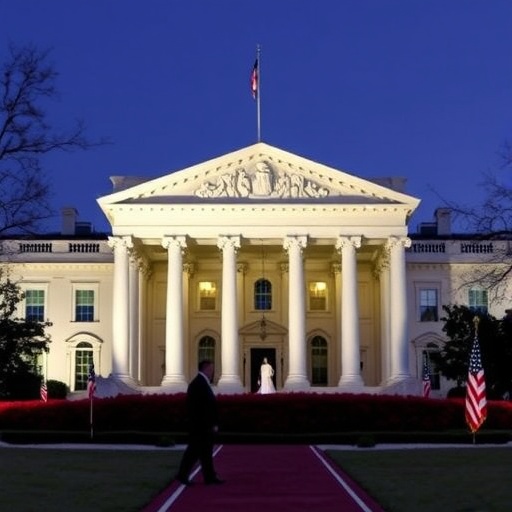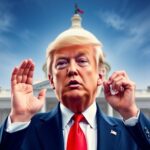Supreme Court‘s Presidential Immunity Ruling Creates Historical Gaps in Trump’s January 6 Case
In a landmark decision that continues to reverberate through American politics and legal history, the Supreme Court‘s 2024 ruling on presidential immunity has effectively shielded key evidence from former President Donald Trump‘s federal legal case related to the Jan. 6 Capitol riot. This ruling, handed down in Trump v. United States, not only delayed the trial but also created enduring voids in the public record of events leading up to the violent insurrection, leaving historians and the public grappling with incomplete narratives about one of the most pivotal days in modern U.S. democracy.
The decision, issued on July 1, 2024, by a 6-3 conservative majority, established that presidents enjoy absolute immunity for actions within their core constitutional powers and presumptive immunity for other official acts. Unofficial acts, however, remain prosecutable. But in applying this framework to Trump‘s case, Special Counsel Jack Smith’s prosecution team has been barred from introducing evidence tied to Trump‘s official duties, such as conversations with White House aides or Justice Department officials. This exclusion has profound implications, as much of the incriminating material—phone calls, memos, and testimonies—stems from Trump‘s time in office, blurring the lines between official and personal conduct.
Legal scholars warn that these evidentiary gaps could distort the historical understanding of Jan. 6, 2021, when supporters of Trump, spurred by his claims of election fraud, stormed the U.S. Capitol, resulting in five deaths, over 140 injured police officers, and an estimated $2.7 million in damages. Without full access to this evidence, the story of how Trump allegedly pressured officials to overturn the 2020 election results remains fragmented, fueling ongoing debates about accountability and the fragility of democratic institutions.
Evidentiary Barriers Erected by Immunity Framework
The core of the Supreme Court‘s presidential immunity ruling lies in its tiered approach to prosecutorial evidence. Chief Justice John Roberts, writing for the majority, argued that immunity is essential to protect the presidency from undue judicial interference. “The President enjoys no immunity for his unofficial acts, and he may be impeached and prosecuted for his conduct in office,” Roberts wrote. However, the opinion’s broad strokes on what constitutes an “official act” have proven challenging for courts below.
In Trump‘s Jan. 6 legal case, U.S. District Judge Tanya Chutkan, overseeing the federal indictment, must now parse which pieces of evidence fall under the immunity umbrella. For instance, Trump‘s January 6 speech at the Ellipse, where he urged supporters to “fight like hell,” might be deemed an official act if linked to his role as commander-in-chief or chief executive. But testimony from former aides like Cassidy Hutchinson, who described Trump lunging at a Secret Service agent in a fit of rage over the certification delay, could be admissible if classified as unofficial.
Prosecutors had hoped to present a comprehensive timeline, including Trump‘s calls to state officials in Georgia and Arizona, his meeting with Vice President Mike Pence, and internal White House deliberations. According to court filings, over 1,000 pieces of evidence, including emails and recorded calls, are now at risk of exclusion. This pruning process, expected to take months, has already postponed the trial beyond the 2024 election, a delay critics like Justice Sonia Sotomayor decried in her dissent: “The majority’s position is a five-alarm fire for our democracy.”
Statistics from the Jan. 6 investigations underscore the stakes. The House Select Committee, which probed the riot in 2021-2022, uncovered evidence of a multi-pronged effort by Trump to subvert the election, including fake elector schemes and pressure on the DOJ. Yet, without court-admissible versions of this material, the federal legal case risks becoming a shadow of its potential, leaving gaps that conspiracy theorists and Trump supporters could exploit to rewrite history.
Unanswered Questions on Trump’s Pre-Riot Maneuvers
At the heart of the Jan. 6 saga are Trump‘s actions in the weeks and days before the Capitol breach, many of which now hover in legal limbo due to the Supreme Court‘s immunity doctrine. Did Trump knowingly incite the riot through his rhetoric, or were his statements protected as official communications? The ruling has forced prosecutors to sidestep this minefield, potentially omitting crucial details that could clarify Trump‘s intent.
Consider the infamous “find 11,780 votes” call to Georgia Secretary of State Brad Raffensperger on January 2, 2021. Recorded and publicly released, this conversation featured Trump pressuring Raffensperger to “find” votes to flip the state’s results. While the call itself might be prosecutable as unofficial, related White House discussions—such as those with Chief of Staff Mark Meadows—are shielded, depriving the legal case of context. Historians like Heather Cox Richardson, author of Democracy Awakening, note that such omissions create “narrative black holes,” where the full scope of Trump‘s election subversion efforts remains obscured.
Further complicating matters are Trump‘s interactions with the Justice Department. The indictment alleges he attempted to install loyalists like Jeffrey Clark as acting attorney general to spread election fraud claims. Emails and memos from this period, detailed in the House committee’s final report, show Trump weighing pardons for himself and allies. Under presidential immunity, these official deliberations can’t be used to prove criminal intent, leaving unresolved whether Trump‘s pressure campaign was a desperate personal bid or an abuse of executive power.
Public opinion polls reflect the confusion. A September 2024 Pew Research Center survey found that 52% of Americans believe the Supreme Court ruling weakens accountability for presidents, while 38% of Republicans view it as a necessary safeguard. This divide amplifies the historical gaps, as future generations may rely on biased accounts rather than a complete evidentiary record.
Legal Experts Dissect the Ruling’s Ripple Effects
Reactions from the legal community have been swift and sharply divided, with many experts arguing that the Supreme Court‘s presidential immunity framework has tilted the scales in Trump‘s favor, particularly for the Jan. 6 legal case. Constitutional scholar Laurence Tribe, in a CNN interview, called the decision “a get-out-of-jail-free card for presidents who flirt with authoritarianism.” He highlighted how the ruling’s presumption of immunity for official acts places an undue burden on prosecutors to disprove presidential motives, a task made harder by the classified nature of much White House evidence.
Conversely, conservative legal analyst Jonathan Turley, writing in The Hill, praised the ruling as a “vital check on partisan prosecutions.” Turley pointed out that without immunity, future presidents could face endless litigation, paralyzing governance. In Trump‘s case, he argued, the decision prevents the use of evidence like Pence’s testimony about Trump‘s election pressure, which Turley deems protected executive deliberation.
Other voices, including the American Bar Association, have urged Congress to clarify immunity standards through legislation. A 2024 ABA report warned that the Supreme Court decision could “erode public trust in the judiciary,” especially amid perceptions of politicization. Quotes from dissenting justices amplify this concern: Justice Elena Kagan wrote that the majority’s approach “breaks new ground” by immunizing actions that “undermine the rule of law,” directly referencing Jan. 6 as a cautionary example.
Quantifying the impact, the Brennan Center for Justice estimates that similar immunity claims could shield up to 30% of evidence in high-profile cases, based on analyses of past presidential scandals like Watergate. For Trump‘s legal case, this means a trial that might focus narrowly on unofficial acts, such as social media posts, while sidelining the broader conspiracy alleged in the indictment.
Broader Prosecution Challenges in the Wake of Jan. 6
Beyond Trump, the Supreme Court‘s ruling casts a long shadow over the hundreds of Jan. 6 prosecutions still underway. More than 1,400 individuals have been charged in connection with the riot, with over 900 convictions as of October 2024, according to the Department of Justice. But for co-conspirators like Rudy Giuliani and John Eastman, who advised Trump on election challenges, immunity-related appeals could delay or derail cases by invoking Trump‘s official actions as a defense.
In state-level legal cases, such as Georgia’s RICO indictment against Trump and 18 allies, the federal immunity ruling isn’t binding, but it influences judicial interpretations. Fulton County DA Fani Willis has vowed to proceed, stating in a press conference, “No one is above the law in Georgia.” Yet, experts predict appeals citing presidential immunity could push trials past 2025, further muddying the Jan. 6 timeline.
The ruling also intersects with Trump‘s other legal battles, including the classified documents case in Florida, where Judge Aileen Cannon dismissed charges in July 2024 partly on immunity grounds. This pattern suggests a judiciary increasingly protective of executive actions, raising questions about whether Jan. 6 accountability will ever be fully realized. Civil suits, like those from Capitol Police officers, face similar hurdles, with evidence exclusions limiting damage awards and public reckonings.
Archival efforts are scrambling to preserve what’s left. The National Archives, in partnership with the House committee, has digitized thousands of documents, but redacted versions due to immunity claims mean the historical record is incomplete. As one archivist told The New York Times, “We’re documenting a coup attempt with one hand tied behind our back.”
Path Forward: Remaking Presidential Accountability Post-Ruling
As the dust settles on the Supreme Court‘s presidential immunity decision, the road ahead for Trump‘s Jan. 6 legal case points to prolonged litigation and potential legislative reforms. Lower courts must now apply the ruling’s guidelines, with remands expected by early 2025. If Trump wins the presidency again, he could direct the DOJ to drop the case entirely, a scenario Justice Sotomayor warned against as enabling “a king above the law.”
Congressional Democrats have introduced bills like the No One Is Above the Law Act, aiming to codify limits on presidential immunity, but passage seems unlikely in a divided government. Meanwhile, international observers, including the EU’s rule-of-law watchdogs, view the ruling as a U.S. vulnerability, potentially emboldening authoritarian leaders worldwide.
For historians, the gaps in the Jan. 6 record underscore the need for transparency reforms, such as mandatory declassification of executive communications post-presidency. As Trump campaigns on vows to “investigate the investigators,” the unresolved questions may fuel division for years. Ultimately, this ruling challenges America to redefine accountability, ensuring that the lessons of Jan. 6—democracy’s near-miss—aren’t lost to legal shadows.








